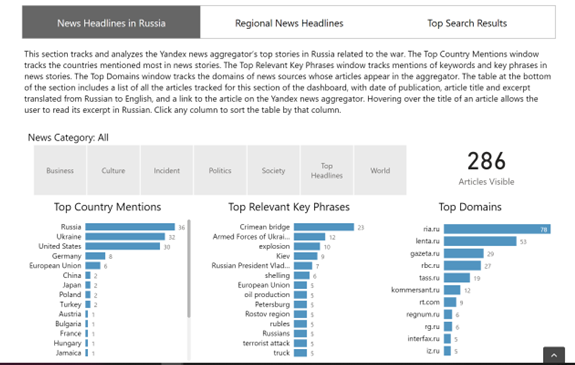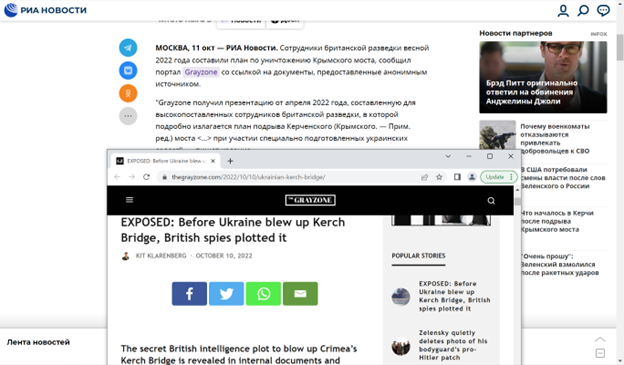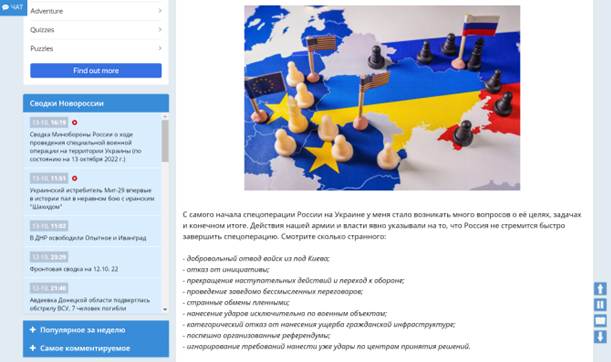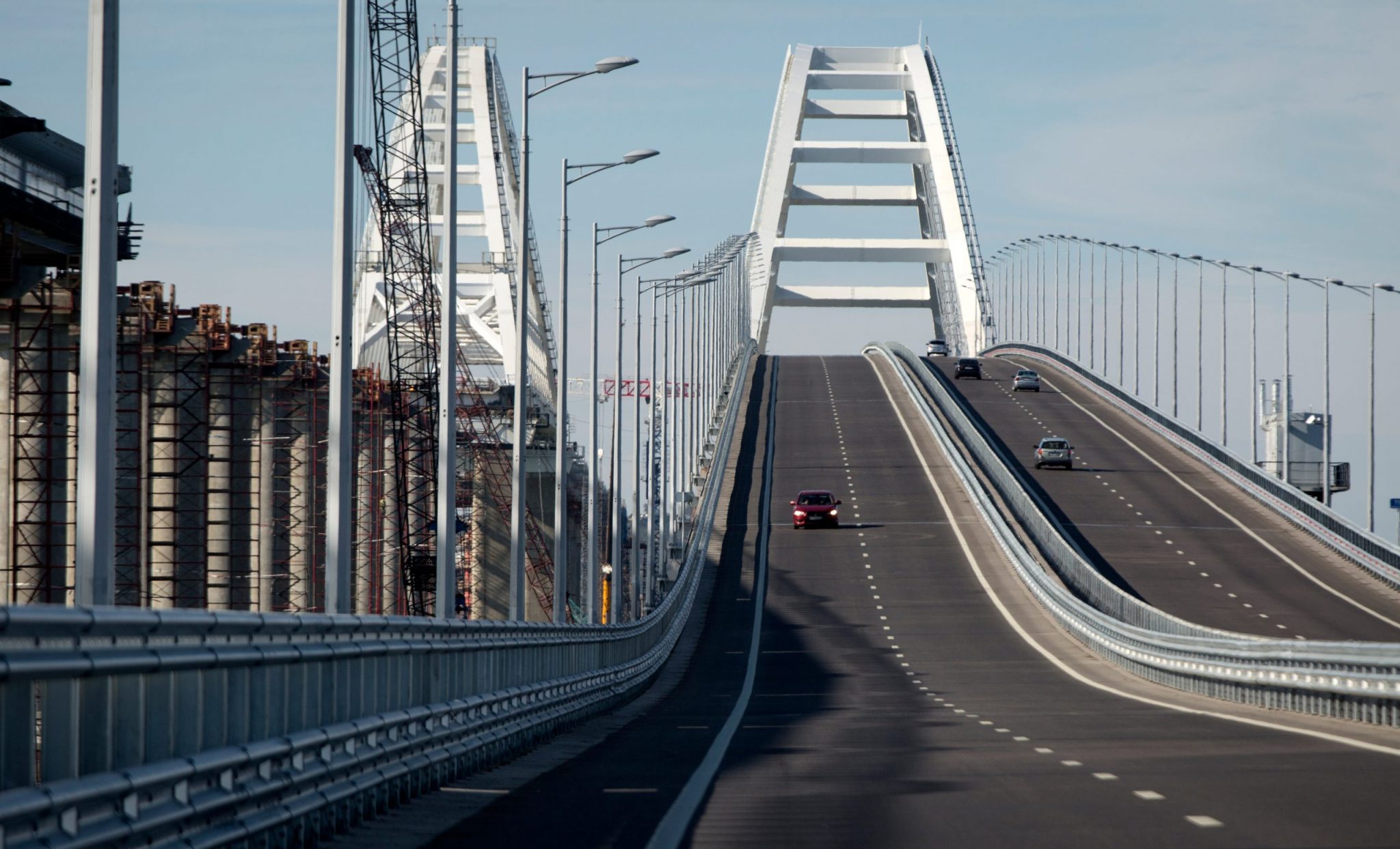Russia has blamed Ukrainian intelligence for the October 8 blast that partially collapsed the Kerch Bridge that connects Crimea to the Russian mainland. Russian President Vladimir Putin called it a “terrorist attack” and promised swift reprisals. True to his word, the Russian military bombed civilian infrastructure as far west as Lviv in the biggest round of air strikes since the start of the war, crippling power, water, and heat throughout Ukraine. It is unsurprising, then, that Russian state-sponsored media has heavily focused on the bridge bombing in articles for a Russian domestic audience over the past week.
According to ASD at GMF’s Yandex Dashboard, in the past seven days, the key phrase “Crimean bridge” far outnumbered other key phrases in domestic headlines. All news comes from state-sponsored outlets, as seen in the “Top Domains” column.

Of the 23 headlines about the bridge, nearly all ascribed blame to Ukrainian intelligence. Perhaps in an effort to bolster the legitimacy of the Russian government’s allegations, one headline from Lenta describes a New York Times article that features a source, a senior Ukrainian official, claiming that Ukraine’s intelligence services had conducted the bombing. However, the Lenta headline is potentially misleading to a Russian audience; it could be interpreted as the US government—or Americans writ large—blaming the Ukrainian services too: “In the USA They’ve Named the Guilty Party in the Crimean Bridge Blast.”

Another noteworthy headline is from a piece in RIA Novosti that links to an article in The Grayzone alleging that British intelligence services devised a scheme to blow up the Kerch Bridge with the involvement of Ukrainian soldiers. The Grayzone article claims the British plan came at the behest of Chris Donnelly, a senior British Army intelligence operative and former advisor to NATO secretary generals (Donnelly’s formal NATO tenure ended in 2003, but the RIA Novosti article implies he is currently working there).

Yandex’s regional headlines had only minimal coverage of the bridge bombing. Even for headlines in Donetsk, coverage was virtually non-existent, featuring instead articles about local military developments, like usual. Headlines for US audiences featured a hodgepodge of topics, but very little on the bridge bombing. Several articles focused on energy prices and the OPEC+ decision to reduce oil production.
Discerning accurate results on the bridge bombing from Yandex’s search engine was complicated by the fact that the dashboard does not include “bridge bombing” or any related terms in its list of search queries. Instead, ASD at GMF collated data from the search query “Special Military Operation” to see how the bombing and Russia’s military rejoinder fared. Search results for “Special Military Operation,” the Russian government’s description of the war it is waging in Ukraine, turned up numerous top results linking to reporting on the bombing, mostly through daily chronicles of the war’s events. The results also featured reporting on Russia’s missile strikes against Ukrainian civilian infrastructure.
However, there were also results to articles pointing to inconsistencies in the Kremlin’s approach to the war and wondering why it wouldn’t respond to Ukraine in kind. The day of the bombing, the most prominent search result after the links to the daily war chronicles was an opinion piece in Svobodnaya Pressa (“Independent Press”) with the following headline: “Why Russia Stubbornly Doesn’t Touch the Bridges Across the Dniepr in Kyiv Itself.” Part of the piece seems to speak for the Russian people who want a commensurate response by bombing bridges in Ukraine. It even quotes a Russian military correspondent, who foreshadows some of the Russian military reprisals by saying Russia should bomb “infrastructure, thermal power stations, and bridges across the Dniepr.”
But the piece also features Russian military experts who point out weaknesses in Russia’s precision guided weapons. One argues that in comparison with American HIMARS, Russia’s missiles simply aren’t precise enough, and Moscow would have to use a significant number of Kalibr missiles to bring the bridges down. In other words, it isn’t worth the significant expenditure in weaponry when Russia is already facing supply problems. The article’s author raises another implicit criticism of the Kremlin’s approach to the conflict; Russia claims it is waging a “special military operation,” and that does not envision bombing critical infrastructure. Only if Ukraine declares war on Russia or if Russia changes the format of the operation would infrastructure come into play. This argument apparently did not sway President Putin from changing the format of the war or refraining from giving the green light to bomb critical infrastructure a few days later.
Two days later, one of the top search results was to another opinion piece seemingly critical of Russia’s special military operations. It lists several grievances, including voluntarily withdrawing troops from around Kyiv, playing defense instead of offense, and “categorically refusing” to bomb civilian infrastructure (this was published a few days before Russia’s mass bombing of critical infrastructure). The author ultimately concludes that Russia is intentionally taking it easy on Ukraine, so the West can spend as many resources as possible in support of Kyiv and ultimately grow tired or incapable of supporting Ukraine any further. Then, Russia could negotiate on advantageous terms with a weakened Ukraine. Still, seeing criticisms of the Russian military featured prominently in Yandex’s search results speaks to a growing frustration among Russians to escalate hostilities and bring the conflict to a favorable and more expeditious conclusion.

Try out the Yandex Dashboard.
The views expressed in GMF publications and commentary are the views of the author alone.





